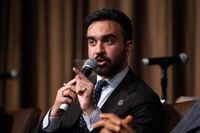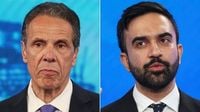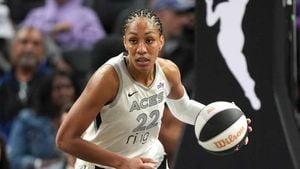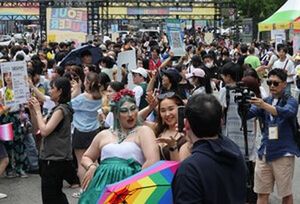As New York City gears up for its pivotal Democratic mayoral primary on June 24, the race between former Governor Andrew Cuomo and state Assemblyman Zohran Mamdani has become one of the most heated and closely watched political contests in recent memory. With early voting commencing on June 14, the candidates are sparring fiercely over experience, policy, identity, and the future direction of the city.
Thursday night’s final debate before early voting began showcased a bitter clash between Cuomo, the perceived frontrunner, and Mamdani, the democratic socialist whose insurgent campaign has surged in recent weeks. Cuomo framed the contest as a test of who is tough enough to stand up to former President Donald Trump, declaring, "Who can take on Donald Trump? That is the big question." He insisted that Trump never sent troops into New York City when Cuomo was governor and promised the same if elected mayor.
Cuomo did not hold back criticism of Mamdani’s relative youth and lack of experience. “Experience matters and I think inexperience is dangerous in this case,” Cuomo said, highlighting Mamdani’s small staff of five compared to the 300,000 employees the mayor oversees. He pointed out Mamdani’s lack of dealings with the City Council, Congress, legislatures, unions, or managing natural disasters like hurricanes and floods.
In response, Mamdani fired back with pointed accusations, contrasting his record with Cuomo’s controversial tenure as governor. “I have never had to resign in disgrace,” Mamdani said. “I have never cut Medicaid, stolen hundreds of millions of dollars from the MTA, or hounded the 13 women who credibly accused [Cuomo] of sexual harassment. I have never sued for their gynecological records. And I have never done those things because I am not you, Mr. Cuomo.” He also corrected Cuomo’s repeated mispronunciation of his name, emphasizing, “The name is Mamdani. M-A-M-D-A-N-I. You should learn how to say it.”
The debate touched on other hot-button issues, including views on Israel. Cuomo asserted, “I’m not antisemitic, I’m not divisive,” distancing himself from the boycott, divestment, and sanctions (BDS) movement. He said he does not give platforms to anti-Semites or extremists who blame America for 9/11. Mamdani, meanwhile, accused Cuomo’s Super PAC of sending mail that distorted his image to stoke division, saying, “The reason he doesn't have a message for Muslim New Yorkers is because he has nothing to say to us.”
Age and identity have become central themes in this race. Cuomo would be the oldest mayor at 67 if elected, while Mamdani, at 34, would be the youngest. Mamdani is also vying to become New York City’s first Muslim mayor, a fact that has brought both support and scrutiny. His background as the son of Ugandan and Indian immigrants, his upbringing in New York City, and his work as a foreclosure prevention counselor have informed his progressive platform.
Mamdani’s policy proposals are ambitious and rooted in democratic socialism. He pledges to freeze rents on stabilized apartments, implement fare-free and faster bus services, establish a Department of Community Safety focused on prevention, and expand affordable housing. He also supports universal free childcare and city-owned grocery stores to reduce food costs. To fund these initiatives, Mamdani proposes raising taxes on big corporations and the wealthiest residents, including increasing the state’s top corporate tax rate and introducing a new city income tax on millionaires. His manifesto also calls for reforming the city’s procurement system and improving tax collection enforcement to raise additional revenue.
However, Mamdani’s outspoken criticism of Israeli policies and his support for the BDS movement have made him a controversial figure among Jewish voters, a crucial constituency that accounts for at least 16% of the Democratic primary electorate. In an effort to win over Haredi voters, Mamdani gave an interview to Der Blatt, a Yiddish-language Hasidic newspaper, expressing empathy for the pain of observant Jews amid rising antisemitic violence and promising to protect their way of life. Despite this outreach, major Hasidic voting blocs in Borough Park and Williamsburg have excluded him from their ranked-choice slates, favoring Cuomo and Council Speaker Adrienne Adams instead.
The debate over Israel has also drawn in other candidates and outside actors. Former hedge fund executive Whitney Tilson, who is polling low but has invested heavily in Jewish outreach, has launched sharp attacks on Mamdani’s Israel stance, accusing him of inciting antisemitic mobs and urging voters to “Vote anyone but Zohran.” Tilson’s campaign has spent significant sums on targeted ads in Orthodox newspapers and digital platforms. Meanwhile, Cuomo has made combating antisemitism a central plank of his campaign, warning that a Mamdani victory would signal tolerance for anti-Israel and anti-Jewish sentiments in New York City.
Amid these tensions, Mamdani has faced vitriolic attacks and threats. At a town hall event shortly after Eid al-Adha, protesters disrupted his speech, accusing him of being too soft on Israel and questioning his Muslim identity. He now travels with security after a man was arrested for lunging at him and biting a volunteer’s hand. Despite these challenges, Mamdani continues to emphasize his commitment to representing all New Yorkers and fighting for safety, equality, and respect for all communities.
Polling data reflects a tight and volatile race. A Public Policy Polling survey conducted in early June showed Mamdani narrowly leading Cuomo 35% to 31%, within the margin of error. However, a Cuomo campaign poll from Expedition Strategies found Cuomo with a 12-point lead after multiple rounds of ranked-choice voting. Another survey commissioned by a Mamdani-aligned super PAC showed Cuomo edging out Mamdani by just two points. These conflicting results underscore the uncertainty heading into early voting and the primary.
Other candidates, including City Council Speaker Adrienne Adams, Comptroller Brad Lander, and former Comptroller Scott Stringer, are seeking to position themselves as viable alternatives, emphasizing experience and a blend of vision and pragmatism. Lander, for instance, has criticized Cuomo’s handling of sexual harassment allegations and called for accountability, while Adams has questioned Mamdani’s readiness to manage the city’s complex challenges.
Public safety remains a divisive topic. Cuomo has portrayed New Yorkers as “afraid on the streets” and has pledged to add 5,000 police officers, framing himself as the candidate committed to law and order. Mamdani, on the other hand, advocates for more social workers to handle non-criminal issues and insists he will not defund the police but work alongside them to improve community safety.
As New York City’s voters prepare to cast their ballots, the mayoral race is a vivid reflection of the city’s diversity and the debates shaping its future. Mamdani’s rise from a long-shot candidate to a serious contender challenges the political establishment and raises questions about experience, identity, and progressive change. Cuomo’s campaign seeks to remind voters of the need for seasoned leadership capable of navigating the city through turbulent times. With early voting underway and the primary just days away, every vote will count in deciding who will lead the nation’s largest city into its next chapter.





